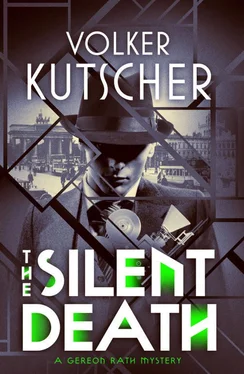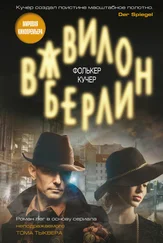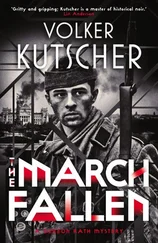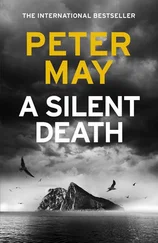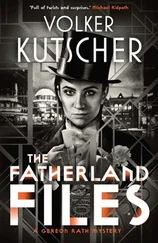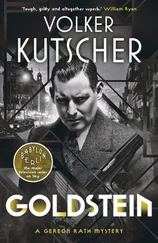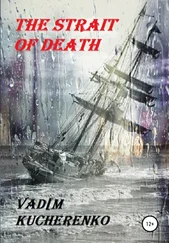‘I’m happy, at any rate, that you have the Buick and that I can still see it from time to time.’ Weinert held tight as Rath took the bend at Bülowbogen at top speed. ‘What do you need a typewriter for anyway?’
‘I’m taking a little work home.’
‘Is it that time again? Can’t you show your face at the station?’
Weinert was brighter than he looked. ‘You work from home too,’ Rath said.
‘Yes, because I was too expensive for my publisher. Now I deliver more stories for less money, and they don’t even have to pay my heating costs.’
‘Times are hard.’
‘You’re telling me? That’s why I’m hoping we can rekindle our working relationship.’ He gestured behind the seat, to where two film cans were clattering alongside the typewriter. ‘Is that part of your case?’
‘Evidence. Winter’s death on celluloid.’
‘They filmed it?’
‘It happened during the shoot.’
‘Come on then, spill.’
‘We’ll do it like we always do. I tell you everything I know, but you wait until I’ve given the green light before publishing.’
‘I can live with that.’
‘And you make sure my name appears in the right places, without making it seem like I’m the one who told you everything.’
‘It isn’t my first time.’
When they arrived at Wassertorplatz Rath parked the Buick directly outside the Nasse Dreieck. ‘Fancy a beer?’ he asked.
Weinert nodded and a few moments later they were sitting at the counter. They were the only patrons at this hour, and Rath suspected they had his status as a regular to thank for the fact that Schorsch, the landlord, had served them at all. He hadn’t even taken all the chairs down, and the boiler hadn’t been on for long. Fortunately the pub wasn’t very big and it would soon warm up.
Rath had taken his things out of the car, and placed the typewriter, film reels and script one after the other onto the counter. Schorsch gave the items no more than a sideways glance, placing two beers and two shorts in front of the early birds, before returning to polishing glasses. The men toasted, drank the shorts and washed them down with beer.
‘Strange place,’ Weinert said, ‘do you come here a lot?’
Rath nodded. ‘Since I moved. By the way, did you know that Zille, the illustrator, used to come here regularly?’
‘Well, not anymore, I guess.’ Weinert raised his glass. ‘God rest his soul.’
‘Do you know a journalist called Fink?’ Rath asked. ‘From B.Z. am Mittag. ’
‘Has he been trying to pump you for information?’ Weinert shook his head. ‘Be careful. You won’t be able to make the same sort of arrangement with him as you can with me. A real hard-nosed type. Sensation before truth.’
‘I thought that was all journalists’ motto.’
Weinert laughed. ‘You should revise your opinion on our profession. With the exception of Stefan Fink, perhaps. So, who has Betty Winter on their conscience?’
‘I haven’t got that far yet, but there’s lots of news. See what you make of it.’
Rath told Weinert everything that he intended to present to Böhm in written form the next morning. The only thing he omitted were Felix Krempin’s telephone calls, but he didn’t want to tell anyone about them, not even his colleagues at the Castle.
Weinert listened attentively. ‘So what are you doing with the script?’ he asked.
‘It says in which scenes the thunder effect was to be triggered. The murderer deliberately chose a scene in which Winter was standing under the spotlight.’
Weinert took the script in his hand and gazed at it thoughtfully. ‘An innocent script as timeline for a murder?’
‘Actually it would be the production schedule that determined the timeline. But in essence, you’re right.’
The journalist hesitated when he read the name on the title page. ‘One of Heyer’s scripts.’ He nodded appreciatively. ‘He isn’t the worst.’
‘You know him?’
‘Willi Heyer used to be a journalist. We met once; I needed a few technical hints for my first film.’
‘You write film scripts?’
‘You’ve got to look out for number one. I haven’t sold any yet, but there are few lying on producers’ desks, awaiting discovery. The problem is, if you don’t have a name then no one reads your script; and you don’t get a name until one of your scripts makes it onto the screen. It’s a vicious circle.’
‘I could introduce you to a couple of producers,’ Rath said.
‘Seriously?’
‘I’m not in Bellmann’s good books at the moment, but I might be able to persuade Manfred Oppenberg. And if Oppenberg wants you, Bellmann will probably be keen on you too.’
‘Sounds good,’ Weinert said.
‘If you could introduce me to this Heyer in return?’
‘Why? Because you think he writes scripts you can use to kill people?’
‘Not intentionally, anyway. I’m hoping he might be able to provide some of the background to Bellmann and Oppenberg’s rivalry.’
Weinert nodded. ‘I’ll see what I can do,’ he said. ‘It’s on me.’ Weinert snapped his fingers for Schorsch, a habit that the Dreieck landlord couldn’t stand, but the journalist was too euphoric to notice.
Rath only had to cross the intersection to get home. A few minutes later, with the script, production schedule and film reels balancing on the heavy typewriter, he negotiated the courtyard at Luisenufer. When he entered the rear building, he discovered he had post. First he had to unload his things at the flat. With great difficulty, he managed to fish the keys out of his coat pocket and open the door.
He unpacked the typewriter and film paraphernalia on the kitchen table, went straight back downstairs and opened his mailbox. Two letters without stamps caught his eye; they reminded him of the envelope containing the five thousand marks last September. He opened the first while still in the stairwell. It wasn’t money, but glossy prints showing grinning male faces. So, Oppenberg had taken care of the photos. There was a fifty-mark note in the envelope, evidence of the producer’s guilty conscience.
The second letter was more official. Rath opened it in the kitchen, recognising the police letterhead.
It was from Böhm!
Since it appears impossible to reach you through the normal channels, we are taking the unusual step of advising you in writing that the investigation into the death of Betty Winter has passed into the hands of Detective Chief Inspector Wilhelm Böhm with immediate effect. Please report to the right-hand signatory without delay upon receipt of this letter.
The right-hand signatory was Wilhelm Böhm. The left-hand side had been signed by Ernst Gennat. So, the bulldog had snitched to Buddha.
Gennat had expressly warned him about going it alone, but did Rath really have anything to reproach himself for? He had kept Gräf, Czerwinski and Henning busy; as well as initiating the search and calling in Forensics and ED. The fact that Böhm was too stupid to reach him was hardly his problem. Gereon Rath wasn’t one of those police bureaucrats who sat around on their fat arses waiting to be put out to pasture. No, he was out there, on the street. The truth could only be uncovered there, on the ground where crime took place, rather than between two file covers.
Rath flung Böhm’s letter in the waste-paper basket, hung his coat and hat on the stand, went into the living room to put on a record, found some paper in the dresser drawer, fetched the open bottle of cognac from the cupboard, and returned to the kitchen where he inserted the first sheet into the typewriter.
Progress was slow initially; he couldn’t help thinking of Charly. Was she worth all the trouble he had landed himself in with Brenner?
Читать дальше
